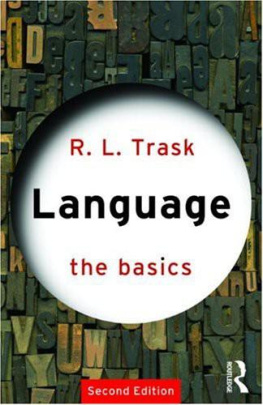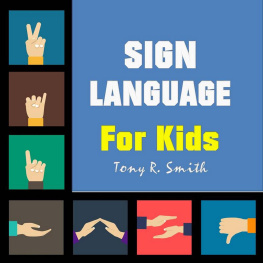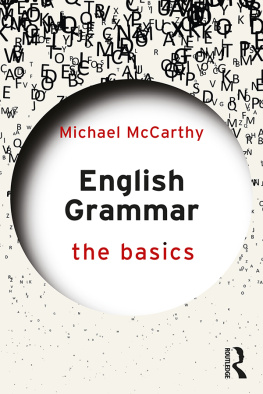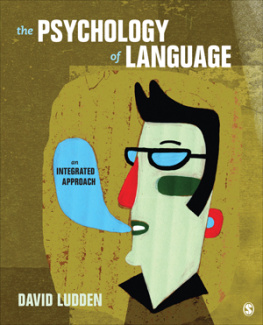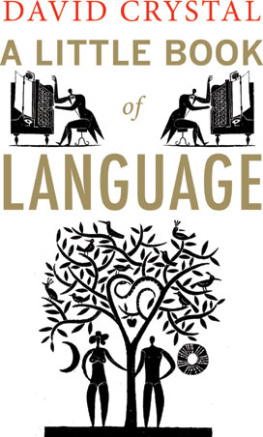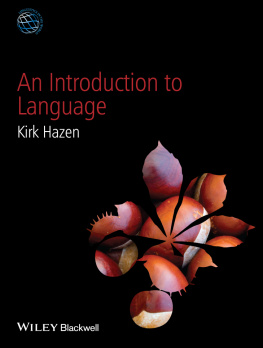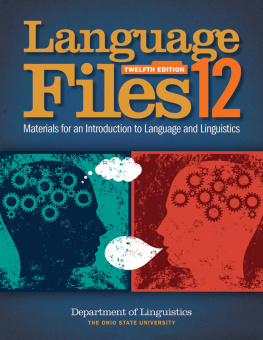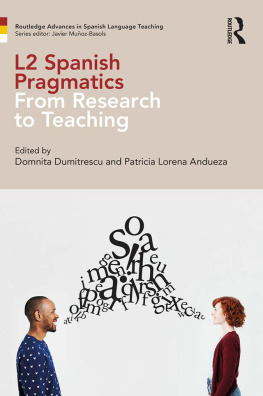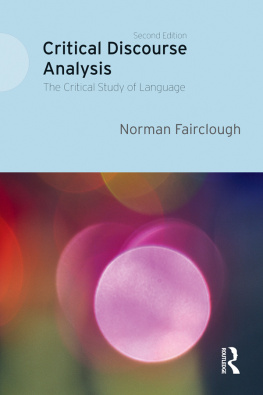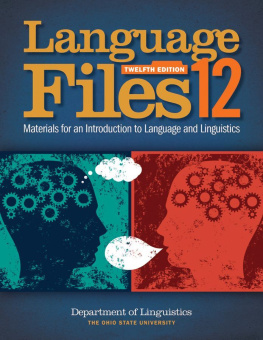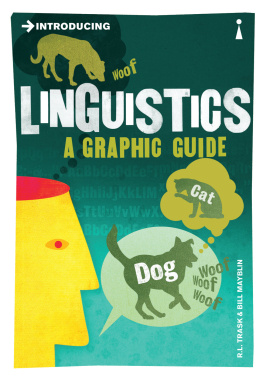Language:
The Basics
From reviews of the first edition:
Trask achieves more than he promises in the introduction; his userfriendly book provides not only basic information on language and linguistics, but willfoster the readers further interest in this area.
Language International
This is the perfect book for anybody who indicates an interest in learning about languages. The style is entertaining and to the point
Language
Very readablegives a stimulating introduction to the major areas of language study.
A.Clafferty, Staffordshire University
It covers a wide range of topics related to language in an accessible manner without being superficial.
Michael Lockwood, Reading University
Language: The Basics provides a concise introduction to the study of language. Written in an engaging and entertaining style, it encourages the reader to think about the way language works.
New features in the second edition include:
a chapter on Language in Use which introduces pragmatics, metaphor, speech and writing, and discourse analysis;
a section on sign language;
a glossary of key terms;
expanded further reading sections.
Language: The Basics provides an accessible overview of a fascinating subject. It is an essential book for all students and anyone whos ever been accused of splitting an infinitive.
R.L.Trask is Professor of Linguistics at the University of Sussex and author of Key Concepts in Language and Linguistics and A Dictionary of Grammatical Terms in Linguistics and Language Change .
Other titles in this series include:
Philosophy: The Basics
Nigel Warburton
Politics: The Basics
Steven D.Tansey
Sociology: The Basics
Martin Albrow
Language:
The Basics
Second edition
R.L. Trask
First published 1995
by Routledge
11 New Fetter Lane,
London EC4P 4EE
Simultaneously published in the
USA and Canada
by Routledge
29 West 35th Street, New York,
NY 10001
Second edition 1999
1995, 1999 R.L. Trask
RoutledgeFalmer is an imprint of the Taylor & Francis Group
This edition published in the Taylor & Francis e-Library, 2005.
"To purchase your own copy of this or any of "Taylor & Francis or Routledge's collection of thousand of eBook please go to www.eBookstore.tandf.co.uk."
All rights reserved. No part of this book may be reprinted or reproduced or utilised in any form or by any electronic, mechanical, or other means, now known or hereafter invented, including photocopying and recording, or in any information storage or retrieval system, without permission in writing from the publishers.
British Library Cataloguing in Publication Data
A catalogue record for this book is available from the British Library
Library of Congress Cataloging in Publication Data
Trask, R.L. (Robert Lawrence),
1944
Language : the basics / R.L.
Trask.2nd ed.
p. cm.
Includes bibliographical
references (p.) and index.
1. Language and languages.
I. Title.
P106.T695 1999
400dc21 9831507
ISBN 0-203-16528-4 Master e-book ISBN
ISBN 0-203-27974-3 (Adobe e-Reader Format)
ISBN 0-415-20089-X (Print Edition)
To my mother
and
to the memory of my father
Contents
lllustrations
| 1.1 |
| 1.2 |
| 1.3 |
| 1.4 |
| 1.5 |
| 4.1 |
| 4.2 |
| 4.3 |
| 5.1 |
| 5.2 |
| 5.3 |
| 6.1 |
| 6.2 |
| 7.1 |
| 7.2 |
To the reader
The book in your hand is not a textbook: it makes no attempt at comprehensive coverage, and it contains no exercises. Instead, it aims only to get you thinking about one of the most important and fascinating topics you could ever hope to encounter: human language. Nothing is more important to us than language, and I hope this little book will quickly persuade you that nothing is more interesting, more stimulating or more rewarding than the study of language.
I have chosen nine very different aspects of the study of language, and under each heading I present and discuss a representative sample of the work which has been done and which is being done now. You will discover that you know a great deal more about the grammar of English than you ever suspected, but you may also be surprised to find that you cant explain the meaning of the word dog . You will learn about the astonishing way in which young children go about the business of learning their first language, about the startling effects on language of genetic defects and brain damage, and about people for whom words have colours. Perhaps you already know that the remote ancestor of English was spoken in Russia, but are you aware that English is changing fairly rapidly at this very moment, and that we can see it changing if we know how to watch?
By the time youve finished this book, you will know something about the mother-in-law languages of Australia, about the amazing gender systems of Navaho, Swahili and Dyirbal, about the strange arrangements the Norwegians have made for their language, and about why plumbers sound different from lawyers; youll learn the truth about those Eskimo words for snow, and youll find out why a universal translator is impossible. Youll learn how we can express meanings that arent actually there, find out why some questions are impossible to ask in English, and find out how the harmless little word nurse can wreck a social occasion.
Some of the work I discuss was done decades ago, but most of it has been done only very recently, sometimes so recently that you will hardly be able to find an account of it elsewhere.
At the end of each chapter, I suggest some further reading for pursuing the topics that particularly engage your interest; the complete list of references is given in the bibliography at the end of the book.
I hope you enjoy reading this book as much as Ive enjoyed writing it!
Acknowledgements
I am grateful to Claire L Enfant and Julia Hall of Routledge for persuading me that I was the right person to write this book. Dick Hudson and two anonymous readers read early drafts of some of the chapters, and Lisa Wale read a draft of the whole book; I am grateful for their helpful comments, most of which I have managed to incorporate into the final version. My thanks, too, to all those colleagues who responded to my requests for information on the Linguist List. Naturally, all remaining shortcomings are the fault of my bridge partner.
Chapter 1
The uniqueness of human language
If you were asked to name the trait which most decisively distinguishes human beings from all other creatures on the planet, what would you choose? Love? Warfare? Art and music? Technology? Perhaps. But most people who have considered this question at length have come up with a single answer: language .
As I shall try to demonstrate, human language is arguably the single most remarkable characteristic that we have, the one that most truly sets our species apart. Our faculty of language, which we usually take for granted, exhibits a number of properties which are remarkable, even astonishing. Without language, we could hardly have created the human world we know. Our development of everything from music to warfare could never have come about in the absence of language. More than any other single characteristic, then, language is what makes us human. And human language is unique.

